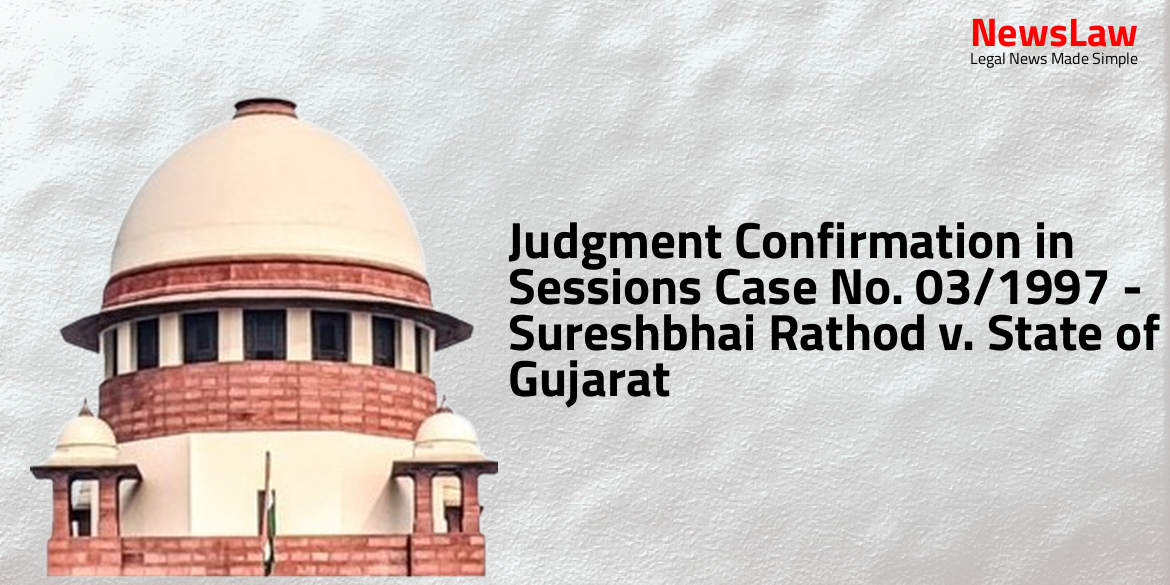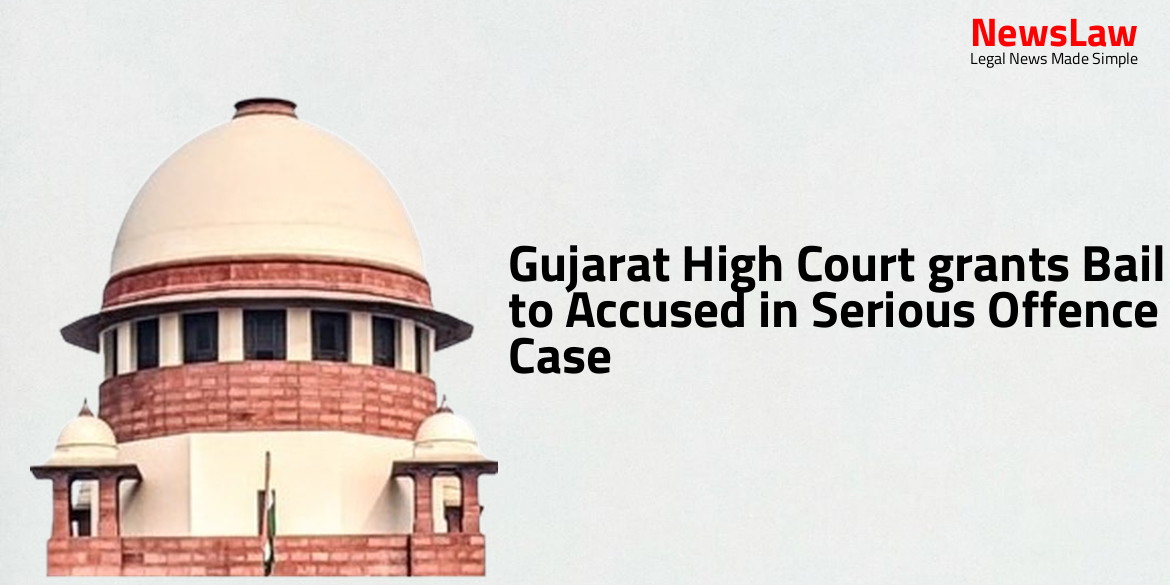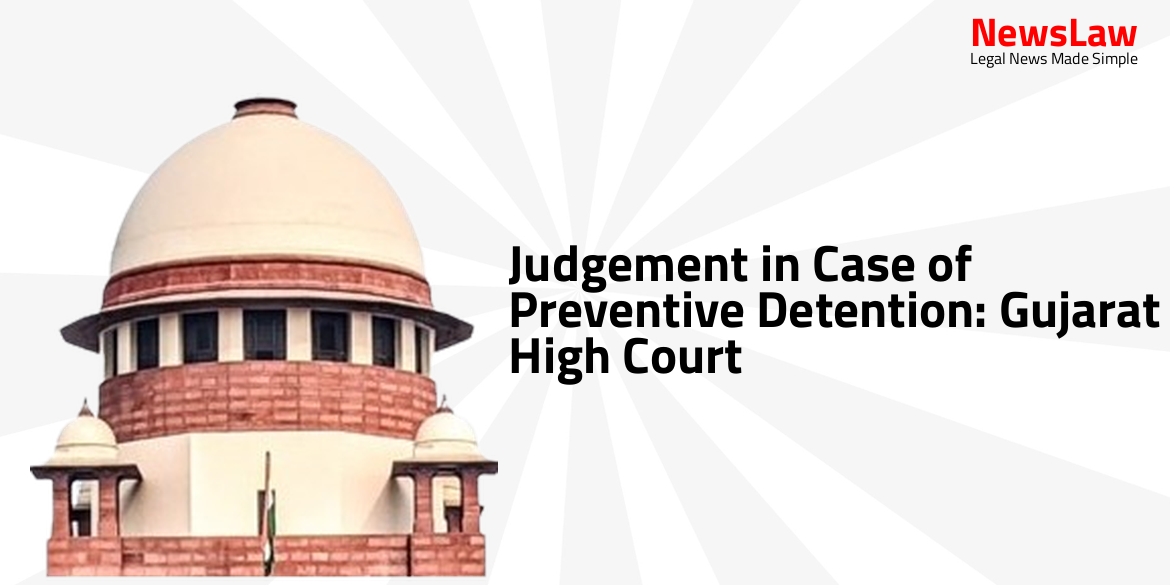In a recent ruling by the Gujarat High Court, the judgment in Sessions Case No. 03/1997 involving Sureshbhai Rathod and the State of Gujarat has been confirmed. The court has upheld the acquittal of the accused following a thorough review of the case. This decision marks a significant development in the legal proceedings surrounding the incident that took place on 06.11.1994. Stay tuned for more updates on this case. #LegalJustice #HighCourt #AcquittalConfirmed
Facts
- Complainant Sureshbhai Rathod and his family went out for dinner in their car on 06.11.1994.
- Their car was stopped at a railway crossing by unknown persons with deadly weapons.
- The accused persons assaulted the complainant, his son, daughter, and wife, looting ornaments and goods worth Rs. 36,000.
- The incident led to the filing of FIR C.R.No.155/1994 at Pethapur police station.
- The PSI visited the scene of the incident, filed a complaint against unknown persons, and the complainant received primary treatment at a hospital.
- The trial court recorded the statement of the accused under Section 313 of the Code.
- After hearing arguments from both the prosecution and the defense, the trial court acquitted the accused under Sections 395 and 397 of the Indian Penal Code.
- The judgment and order of acquittal were dated 13.08.1998 in Sessions Case No. 03/1997.
Issue
- The issue involves whether the fair copy of the judgment needs to be presented to their Lordships for review.
- Also, it questions whether the case pertains to a substantial legal question regarding the interpretation of the Constitution of India or any of its orders.
Arguments
- The learned trial Court acquitted the accused based on unjust, improper, perverse, and unwarranted reasons.
- The prosecution has successfully proven the guilt of all accused.
- The prosecution’s case is supported by the complainant, his family members, and the investigating officer.
- The test identification parade, conducted in the presence of an Executive Magistrate, further supported the prosecution’s case.
- Complainant’s identification of the accused was crucial in linking them to the crime.
- Stolen ornaments were recovered at the instance of the accused.
- Injuries sustained by witnesses and the complainant were supported by medical evidence.
- The trial court acquitted the accused based on irrelevant facts and failed to consider substantial evidence.
- The appellant contends that the acquittal should be overturned, and the accused should be convicted based on the strength of the prosecution’s case.
- Learned counsel for the respondents have supported the impugned judgment and order.
- Prosecution failed to prove the case against the accused beyond reasonable doubt.
- Panch-witnesses turned hostile which weakened the prosecution’s case.
- Incident took place on the fateful day when the complainant and family were at the hotel.
- Accused were acquitted based on lack of evidence proving the offense beyond reasonable doubt.
- Respondents argue that the present appeal is meritless and should be dismissed.
Analysis
- The T.I. parade conducted after 8 months did not yield substantial evidence connecting the accused to the alleged offence.
- Prosecution failed to produce clinching evidence to connect the accused persons to the offence beyond reasonable doubt.
- The prosecution relied heavily on the T.I. Parade and recovery of ornaments, neither of which provided compelling evidence against the accused.
- Witnesses turned hostile, weakening the prosecution’s case further.
- The court rightly found that there was insufficient evidence to prove the accused guilty under Sections 395 and 397 of the IPC.
- Muddamal in melted form was not recovered from all accused, further weakening the case.
- Prosecution could not prove the accused used deadly weapons or committed robbery, essential elements for Sections 395 and 397.
- The T.I. Parade lacked credibility as photographs were circulated prior to it, casting doubt on the identification process.
- The stolen articles were not recovered in their original form, affecting the prosecution’s case.
- The executive magistrate’s testimony did not provide substantial evidence, and panch-witnesses did not support the prosecution’s case.
- The complainant and his family identified the accused in court, but their testimony lacked supporting evidence.
- Overall, lack of concrete evidence and discrepancies in witness testimonies led to the acquittal by the learned Sessions Judge.
- The High Court should always give proper weight to the views of the trial Judge regarding the credibility of the witnesses.
- There is a presumption of innocence in favor of the accused, which is not weakened by the acquittal at the trial.
- The accused has the right to the benefit of any doubt.
- Appellate courts are slow in disturbing a finding of fact made by a Judge who saw the witnesses.
- The cardinal principle of criminal jurisprudence is the presumption of innocence in favor of the accused unless proven guilty.
- The burden of proving the case always rests on the prosecution.
- The onus on the prosecution is more burdensome before the appellate court due to the double presumption of innocence.
- In the appeal against acquittal, the appellate court needs to ascertain if the trial court’s view can be considered a possible one, particularly with analyzed evidence on record.
- An order of acquittal adds to the presumption of innocence in favor of the accused.
- The appellate court should be slow in reversing the trial court’s order of acquittal.
- An accused benefits from a double presumption in their favor, which must be disturbed only through thorough scrutiny based on legal parameters.
- The learned trial Court’s reasons for acquitting the accused are just, legal, and proper.
- No palpable errors were pointed out by the learned APP in the trial Court’s reasons.
- Material contradictions were found in the prosecution’s evidence by the trial Court, undermining the case’s foundation.
- The prosecution failed to prove the case against the accused beyond all reasonable doubts.
- The trial Court did not err in acquitting the accused based on the lack of sufficient evidence.
Decision
- Bail bond given by the accused stands discharged.
- Record and proceedings to be sent back to the concerned trial court.
- Judgment and order of acquittal confirmed by the learned Additional Sessions Judge, Ahmedabad (Rural) at Gandhinagar.
Case Title: STATE OF GUJARAT Vs. MITHU UMAR SINDHI
Case Number: R/CR.A/917/1998



